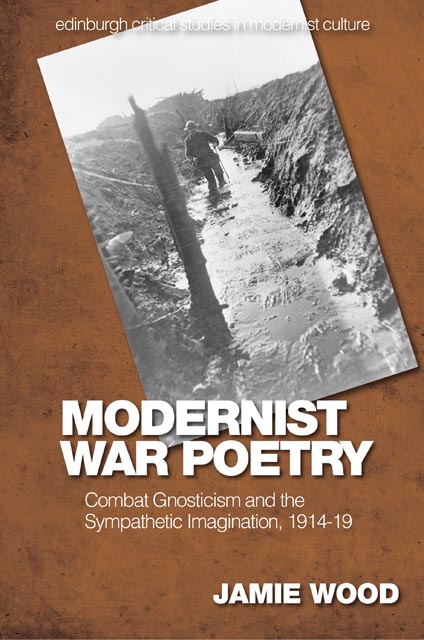Book contents
- Frontmatter
- Contents
- Timelines
- Acknowledgements
- Series Editors’ Preface
- Introduction
- 1 Early Modernist Responses to Combatant Poetry: 1914–Spring 1915
- 2 Reassessing Disaster: 1915
- 3 The Three Lives of Gnosticism: 1916–Summer 1917
- 4 An Emergent Critique of War Experience: Autumn 1917–Spring 1919
- 5 The Form and Practice of Modernist Distaste: Summer–Autumn 1919
- Conclusion
- Bibliography
- Index
5 - The Form and Practice of Modernist Distaste: Summer–Autumn 1919
Published online by Cambridge University Press: 13 April 2023
- Frontmatter
- Contents
- Timelines
- Acknowledgements
- Series Editors’ Preface
- Introduction
- 1 Early Modernist Responses to Combatant Poetry: 1914–Spring 1915
- 2 Reassessing Disaster: 1915
- 3 The Three Lives of Gnosticism: 1916–Summer 1917
- 4 An Emergent Critique of War Experience: Autumn 1917–Spring 1919
- 5 The Form and Practice of Modernist Distaste: Summer–Autumn 1919
- Conclusion
- Bibliography
- Index
Summary
America and the War in Poetry
Although ‘The New Elizabethans and the Old’ never found its way into The Sacred Wood and scholars have disregarded it, the essay was important for T. S. Eliot. A few weeks following its publication in The Athenæum he mentioned to his mother an upcoming lecture on 31 May at London University. Eliot either abandoned it or we have lost the manuscript, but Eliot planned, he said, to cover the younger generation of poets. It may well have been a version of the lecture he finally gave to the Arts League in October 1919, discussed later in this chapter. However, given Eliot wagered his London University lecture was to be on a delicate subject it is unlikely it merely attacked the Georgians. Poetries of war were the especially delicate subject in London during 1919. It was a society marked by the mass demobilisation of its armies, the tending of its wounded and the commemoration of its dead.
On 9 July Eliot sent ‘The New Elizabethans and the Old’ to John Quinn. He recommended it for inclusion in the volume Alfred Knopf would eventually publish as Poems (February 1920). Initially this was to be a volume entitled A Book of Verse and Prose. Eliot told Quinn that the essay might address the interest of the American public in the war. Although the combined volume of prose and poetry never happened, Eliot ensured the link to the war in Poems (1920) via its dedication to Jean Verdenal. Eliot had originally published the same dedication in Prufrock and Other Observations but felt it was unnecessary in Ara Vos Prec, the English edition of Poems, where he used Dante instead. The reference to Dante differentiated, as in ‘In silent corridors of death’, between those souls forced to suffer and those souls wishing to suffer as penitents as they journeyed through purgatory.
What American interest was Eliot referring to when he sent ‘The New Elizabethans and the Old’ to Quinn? There was certainly no straightforward evidence of that interest in the internationalist oriented Little Review. There is a clear shallowness to the single blank page that Margaret Anderson inserted into the April 1917 edition of the magazine as the United States entered the war. Anderson’s caveat that the Little Review might be censored for this non-statement is not redemptive.
- Type
- Chapter
- Information
- Modernist War PoetryCombat Gnosticism and the Sympathetic Imagination, 1914-19, pp. 174 - 213Publisher: Edinburgh University PressPrint publication year: 2022



